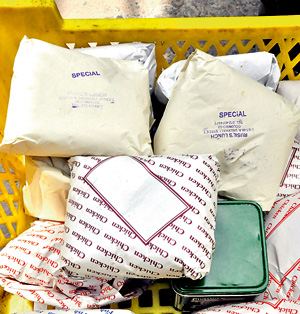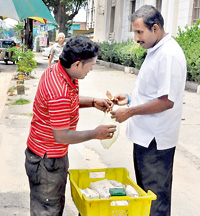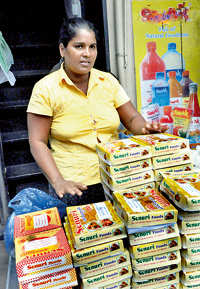Most food vendors in the city have switched to white paper wraps from newspapers after the Colombo Municipal Council's (CMC) public health department educated them on the hazards of newspaper print which can contaminate the food with lead causing health problems.
 |
| White paper wrappers are better for food than newspaper. Pix: Mangala Weerasekera |
|
Rusil’s Lunches are hot and hygienic. |
|
Ayoma Perera: 300 packets go in four hours. |
Last week, CMC’s Chief Medical Officer Dr Pradeep Kariyawasam organised a mandatory awareness programme on food hygiene and clean food practices for food vendors in Colombo city.
Vendors were instructed to register with the CMC and advised to avoid using newspapers and disposable polystyrene boxes to pack food items as they have a negative impact on health and the environment respectively.
The city's food vendors should forward the applications forms, issued by the CMC, to medical heath officers (MHOs) in their respective localities. The health officers will inspect the premises where the vendors prepare and package their food, and issue certificates confirming that minimum hygiene standards are being observed. The vendors will then be issued identity cards.
"With the development of the country, we have to improve the food hygiene standards," Dr. Kariyawasam told the Sunday Times.
Packaging is getting special attention. Newspapers and polystyrene materials will not be used in future, Dr. Kariyawasam said, pointing out that newspapers collect dust and newsprint carries lead.
The food is usually wrapped with polythene and then covered with newspaper. But the newsprint can still come into contact with the food. "People wash their hands and when they unwrap the packets they touch the paper and then the food. Sometimes, the polythene wrap is smaller than the newspaper and in such packets the food will come in dirct contact with the newsprint.
It is not uncommon to see food covered with newsprint smudges, he said. "I've seen newspaper print on the buns," Dr. Kariyawasam said. Food items such as buns and rotis are often sold in bags made of newspaper.
Lead is a harmful substance and long-term deposits in the body can lead to various illnesses. Chemicals mixed with polystyrene to make lunch boxes can poison the food and may even lead to cancer, he elaborated.
Polystyrene is non-biodegradable and pollutes the environment. Discarded polystyrene boxes can collect rainwater and aid in mosquito breeding, according to the doctor. "We recommend cardboard boxes," he added.
M. Athula Senevirathna of Sarasa Caterers has been in the food catering business for 29 years, and sells between 120 to 140 food packets a day. "This is a good initiative," he said. We have always used polythene to wrap food, which we sell in cardboard boxes. We have already submitted our applications to the public health inspector."
The vendors were also directed to sell their food within five hours after preparation. "The food (in packets) gets spoiled after five hours," Dr Kariyawasam said. "We told the vendors it is not possible to produce 100 per cent microbe-free lunch packets. With time, microbes multiply."
Each lunch box must be stamped with information giving the time and date the food was prepared and the name and address of the caterer. "People should know where they are getting the food from and if they have a problem with the hygiene of the food they can complain to us," Dr Kariyawasam said.
If there are doubts about the food, the lunch box contents will be sent to a laboratory and checked for microbes.
Most food packets, vendors say, are sold within four hours of being put up for sale.
Ayoma Perera of Senuri Foods said they prepare the food at 10 a.m., pack it by 11 and sell it within four hours of packing. "We sell 300 packets a day," she said.
Rusil Chandramohan of Rusil's Lunch says he prepares short-eats and lunch packets in bulk and sells them to retail outlets. "We prepare the short-eats before 9 a.m. and the lunch between 9 and 11 a.m. We also sell some lunch packets before 1.30 p.m."
The Public Health Department has identified 105 lunch box vendors operating in the city, about 20 per cent from outside Colombo. "We think there are 250 vendors in total," said Dr Kariyawasam. Vendors from outstations will also be certified after inspection.
The food sellers will undergo a training in preparing and packaging food under hygienic conditions. "There will be a simple test, and those who have followed the training will be certified. Under the food act, everyone has to be registered. We have not implemented this in the past, but we are doing so now."
A kilogram of newspapers is Rs 30, while a kilo of plain white wrapping paper is Rs 110, according to one of the vendors. "We have all agreed to follow the CMC regulations," he said.
The Chief Medical Officer was firm on the matter of pricing. "Vendors should not raise their prices because of the new packaging. There is 100 per cent profit in the food industry. It is one of the most profitable industries in the country. They can easily afford the price change."
There have been no objections from vendors about the new packaging directives, according to Dr. Kariyawasam
The CMO said the registration process can be completed in two months. The registration is exclusively for food vendors and is not linked to the licenses issued to hotels and restaurants.
Food vendors will be under scrutiny and if any are found to be violating CMC regulations on food hygiene, they will be issued a warning. If they continue to flout the rules, their registrations will be cancelled.
According to Dr. Kariyawasam, the food hygiene programme might be followed up in the rest of the country as well. |




